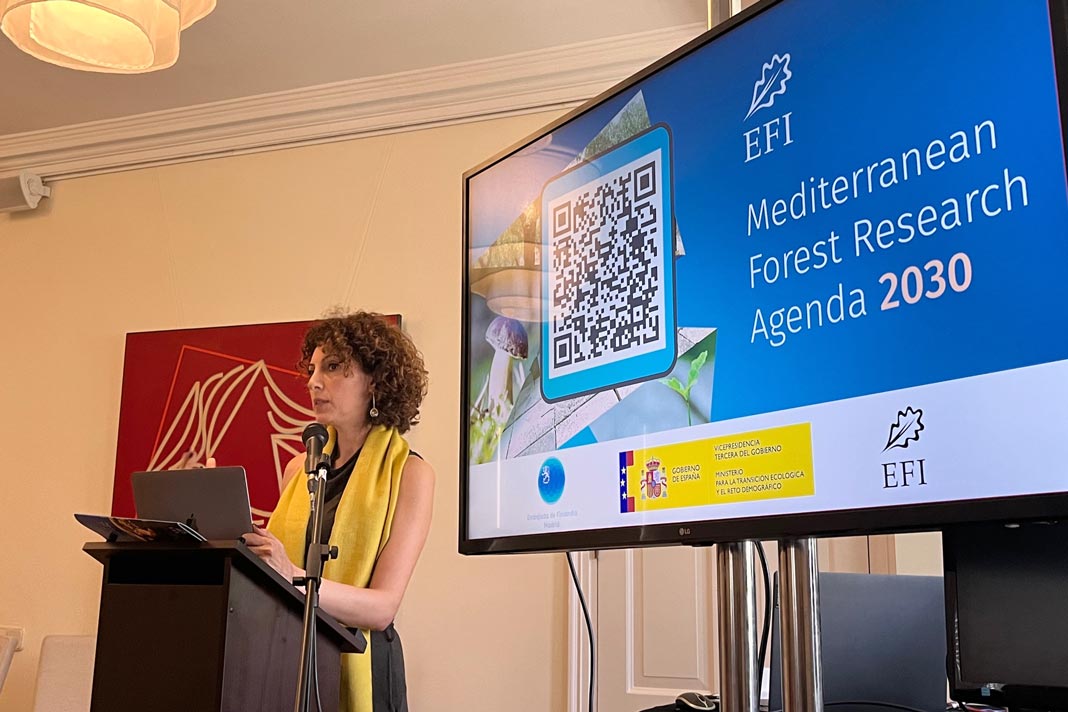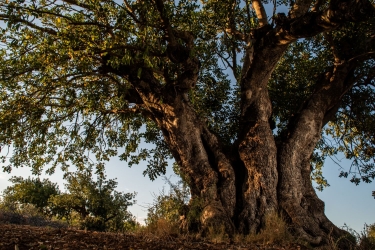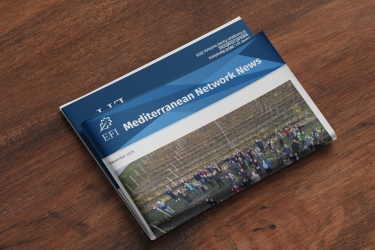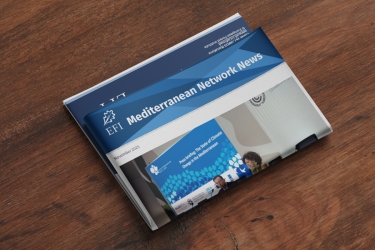High-level seminar on the potential of forests in climate change mitigation
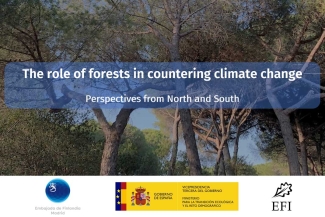
Sustainable forest management, forest-based development cooperation activities and bioeconomy innovations all play a crucial role in climate change mitigation, especially when integrated with each other. Bringing together diverse but complementary speakers to explore these topics proved to be key to the success of a high-level seminar “The Role of Forests in Countering Climate Change – Perspectives from North and South”, held in Madrid on 15 March 2023.
The event was organised by the Embassy of Finland in Spain and the European Forest Institute Mediterranean Facility (EFIMED), together with the Ministry for the Ecological Transition and the Demographic Challenge of Spain (MITECO). Distinguished experts explored the interconnections between forests, biodiversity, and climate change, forest-based international cooperation initiatives, and bioeconomy innovations through presentations and panel discussion.
The seminar was opened by Sari Rautio, Ambassador of Finland to Spain and Andorra, who underlined how Finland and Spain, although at two opposite ends of the European continent and characterised by very different forest types and uses, share the challenges of the impacts of climate change and an interest in maximising the potential of forests in fighting this issue. María Jesús Rodríguez de Sancho (MITECO) added that sustainable forest management and initiatives to tackle land abandonment are key to protect forests, seize bioeconomy opportunities and fight climate change.
Bart Muys (KU Leuven) began the first session by presenting the current challenges of integrating climate smart forest management with biodiversity, highlighting the trade-offs and win-wins of climate mitigation efforts in forests. Kerstin Stendahl (Ministry for Foreign Affairs of Finland) reflected on threats to forest ecosystems, through deforestation, land degradation, and pollution, etc., and how forests and sustainable forest management can contribute to many of the UN Sustainable Development Goals. Finally, Iván Martínez Castro (MITECO) considered the perspective of Mediterranean countries, displaying the contributions and challenges of Spanish forests in achieving climate goals.
A panel discussion followed, moderated by EFIMED Head, Michele Bozzano, to explore how forests are becoming a priority within international development cooperation programmes. Grammenos Mastrojeni (Union for the Mediterranean) highlighted how stable ecosystems keep people connected to their lands: cooperation initiatives must tackle the vicious circle in which climate change impacts very strongly on indigenous communities and poor populations, removing the possibility to properly manage forests and landscapes, and consequently affecting people’s wellbeing and security while threatening global efforts in climate change mitigation. Maite Martín-Crespo (Spanish Development Cooperation Agency - AECID) agreed with the importance of putting local communities at the centre of cooperation initiatives: the development model implemented by AECID integrates respect for people, biodiversity and the environment, ensuring the conservation and sustainable use of terrestrial ecosystems. Julio Urruela Roquero (International Centre for Advanced Mediterranean Agronomic Studies) underlined the necessity to invest in capacity building around the interconnection of forests and agriculture. Finally, Jose Manuel Moreno (Academy of Social Sciences and Humanities of Castilla-La Mancha) focused on how land abandonment has huge impacts on forest ecosystems and local communities, including increasing wildfire risk.
The second half of the event focused on the contribution of forest-based industries to the fight against climate change and the opportunity offered by forest bioeconomy enterprises. Eero Mikkola (Natural Resources Institute Finland) and Tuomo Kauranne (Arbonaut) illustrated how, in Portugal, sustainable forest management contributes to wildfire risk prevention and also provides economic opportunities and green jobs. Then, Maria Björk (Stora Enso Biomaterials) showcased the opportunities offered by the use of lignin as an alternative for fossil raw materials.
In the following panel, moderated by Pablo Sabín (Cesefor), the discussion delved deeper into the topic of forest-based bioeconomy. Antti Valle (Ministry of Economic Affairs and Employment of Finland) presented the bioeconomy strategy implemented by Finland, and Genoveva Canals (Union of Wood Working Industries and Furniture in Spain) shared how the biomaterials and forest-based product sectors are developing in Spain. The dialogue was enriched by Daniel Ibáñez (Institute of Advanced Architecture of Catalonia) who showcased the opportunities offered by timber for construction and Shahriare Mahmood (Spinnova PLC) who offered the perspective of the textile sector.
In her concluding remarks, Magda Bou Dagher Kharrat, Principal Scientist at EFIMED, observed that many speakers had mentioned the importance of integration at various levels: bringing together the different actors related to forests and forest management; connecting bioeconomy entrepreneurship and scientific knowledge; and taking into account the needs and views of local communities. In this way, the complex environmental challenges posed by climate change can be addressed, while contributing to make our planet a more just and equitable place. Sari Rautio concluded the event by expressing the hope that this fruitful discussion will continue in the future.
